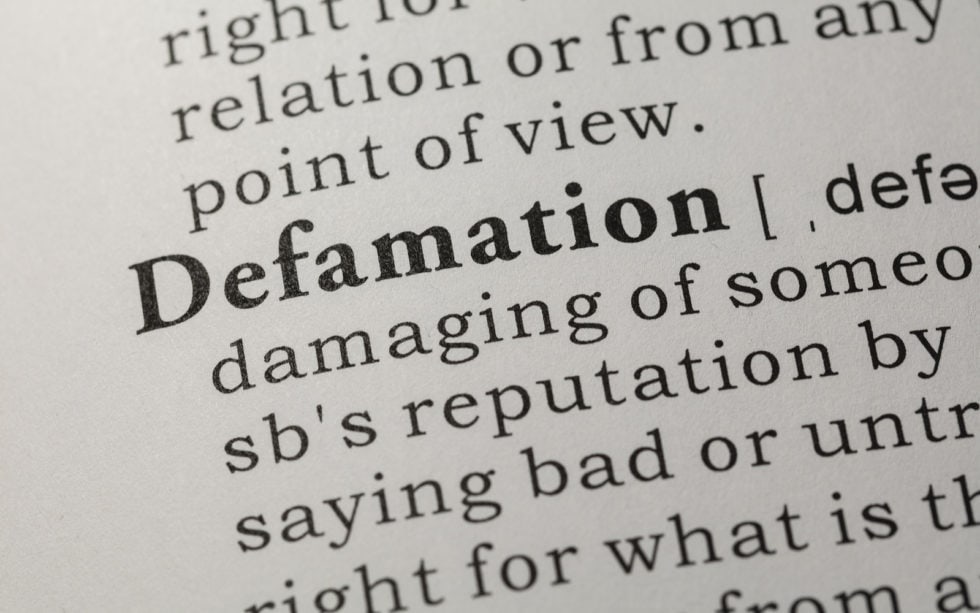Attorney advertisement by Edwin Aiwazian of Lawyers for Justice, PC, headquartered at 450 N Brand Blvd, Glendale, CA 91203
Regardless of your dedication and commitment to your job, workplace defamation can completely ruin your reputation. It can even lead to a loss of promotion, bonuses, or your position and prevent you from getting hired. Unless your employer has a legally acceptable defense, you can claim they engaged in defamation. Here is more information on how this works and what is needed to prove a defamation claim.
What Is Workplace Defamation?
Defamation of character in the workplace involves false statements that harm an individual’s reputation. It can be done so verbally or through an employer’s conduct as:
- Libel: A statement in writing or depicted via a picture, image, or other printed material. Defamation can also take form via an email, online chat, or text message that spreads harmful, false, and negative information.
- Slander: A verbal/spoken statement that’s false yet attempts to convey the details are true. Rumors are often spread in this way as an intentional means to turn others against the target and damage their perceived character.This can result in severe consequences such as termination, demotions, or limited career progression opportunities.
Workplace Defamation
Defamation in employment involves any employer, co-worker, or customer who acts in a way that harms the plaintiff employee via negligence or carelessness. A false statement may be a letter of reference from a former manager. Instead of highlighting an employee’s strengths, this communication damages their reputation or hurts their chances of getting hired.
What Are the Elements Required to Prove Workplace Defamation?
It’s not easy to sue an employer for defamation. A defamation lawyer requires several forms of evidence. It’s therefore crucial to gather as much as possible. To prove the tort of defamation, the details provided must show the statement is false, published, defamatory, unprivileged, and intended to or inherently cause injury or damage to the plaintiff’s character.
Here are the elements needed to build your case and prove workplace defamation occurred:
- False: The statement must be false. Otherwise, it can’t be used to build a defamation claim. Witnesses can provide details that show it is indeed a false accusation.
- Publication: It must be communicated to a third party, whether a manager, co-worker, or potential future employer who understands its defamatory meaning.
- Defamatory: Only false statements of fact are actionable for a defamation claim. Opinions are not. For example, a negative job performance evaluation is generally a statement of opinion; it is therefore usually not actionable.
- Unprivileged: An employer is privileged to make statements about employees to other employers. Such is not the case if the statement was unprivileged. This means someone had no right to communicate the information to a third party.
- Causing harm/damage: One must prove the false publication caused a direct specific harm or damage to the plaintiff. Sometimes, the very nature of the statement is harmful, which is known as defamation per se. Examples include statements that cause ridicule, contempt, or injury to one’s profession, as well as accusations of immoral conduct or a serious crime.
Gathering Evidence for a Workplace Defamation Claim
The more evidence you have, the easier it is to build your claim. If you find a false statement in a document, email, or on social media, for example, take a photograph or screenshot. Obtain contact information from witnesses if they are present; they can help build your case if able to verify the false statement isn’t true. Don’t ignore the situation when a false accusation is made, as this can do more harm than good.
Get Legal Help Now for Workplace Defamation
If you believe you’ve been defamed at work, contact Lawyers for Justice, PC. We are conveniently based in Glendale, CA and our Los Angeles workplace defamation attorney can assess your claim and evaluate all the facts. Our team is here to help get the justice you deserve. Don’t wait to get started. Call our workplace defamation lawyer at 818-JUSTICE today for a free case consultation.
Attorney advertisement by Edwin Aiwazian of Lawyers for Justice, PC, headquartered at 450 N Brand Blvd, Glendale, CA 91203
Think you deserve justice?
-
Get a Free Case Evaluation
-
Retain Service with No Upfront Cost
-
Get the Justice You Deserve
-
No Win, No Pay









